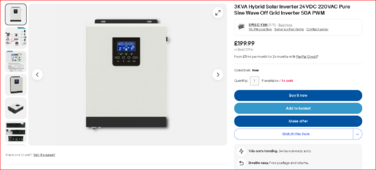highwaypirate
New Member
AND you can always add more components to it if you find yourself needing more power. When I started out, I thought a 50w array would power my life out here (it didn't). So I added a 200w array to the Honda... still wasn't enough. Then along came two 175w arrays... it FINALLY does the job, and I don't use much power at night, lol.DIY IS ALWAYS BETTER!!! -

{ok, just had to say it.}
A big benefit to DIY - you will understand every component, how it works, how it is connected. You will be in control. You will learn a lot more, and will become confident in your work. You will be able to confidently trouble-shoot any issues that may arise in the future.
- And we will get to see the build as you post about it!
If you know what your needs are and what you can live with/without, that will help you with your decision. I personally calculate for 10 days of absolutely no incoming power for my system, just to be safe.
EDIT: Or do both! Have a house battery with it's own system and run a power station alongside it. I'm ordering an EcoFlow River 2 because 1] I really need a PSW inverter and my PowerQueen hates inverters with a passion (endless sparking due to their cheap bms) and 2] if your main system goes down, the power station still has power to supply other components while maintenance is underway.




